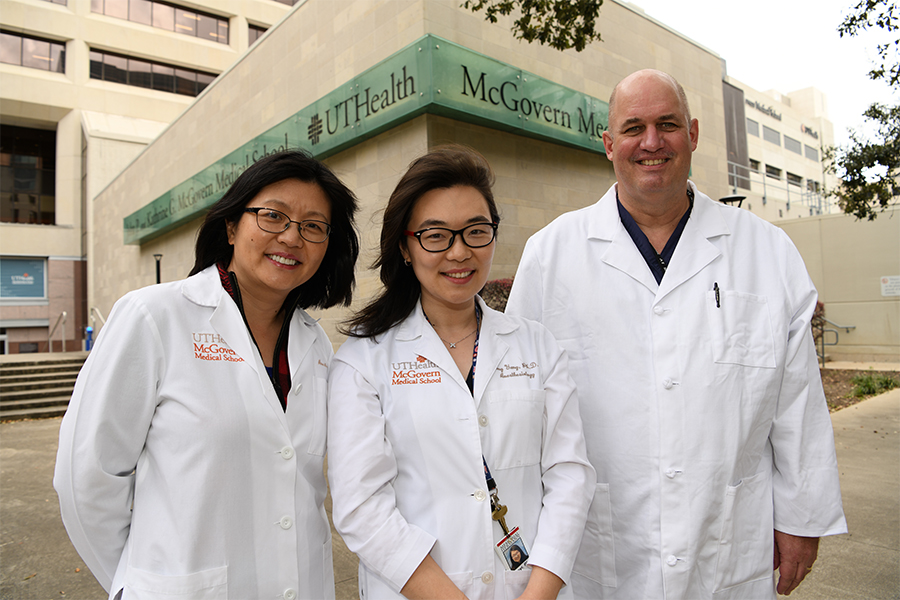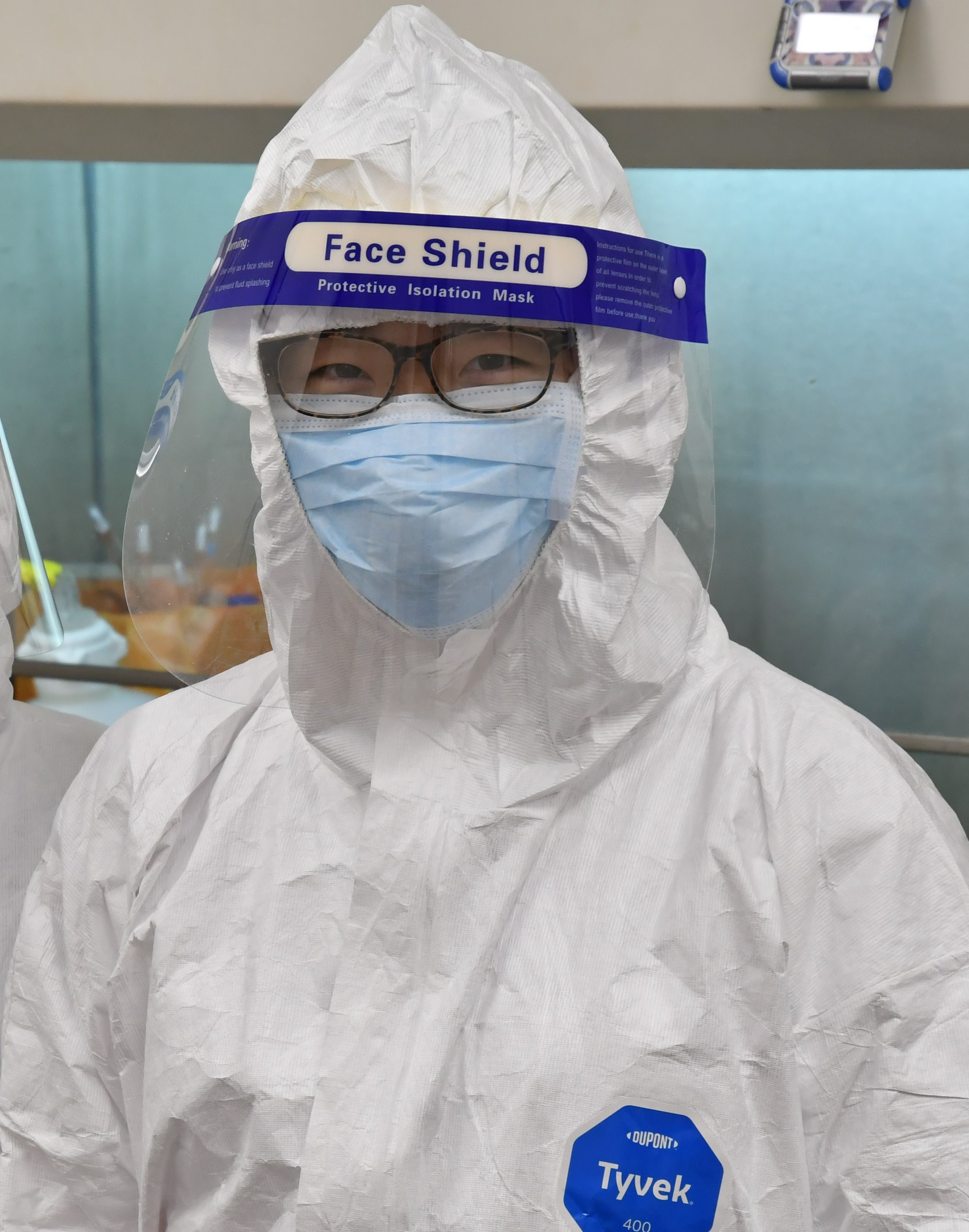Yuan receives R01 grant for ARDS research

 The National Institutes of Health (NIH) has awarded Xiaoyi Yuan, PhD, assistant professor in the Department of Anesthesiology, a nearly $2 million Research Project Grant (R01) to fund research on acute respiratory distress syndrome (ARDS).
The National Institutes of Health (NIH) has awarded Xiaoyi Yuan, PhD, assistant professor in the Department of Anesthesiology, a nearly $2 million Research Project Grant (R01) to fund research on acute respiratory distress syndrome (ARDS).
The grant funds Yuan’s project, titled “Targeting Myeloid Depended MicroRNAs in Acute Respiratory Distress Syndrome.” An R01 is the NIH’s highest offered grant.
“I’m very grateful for this award,” Yuan said. “It always takes a village, but for the R01 I think it takes more than a village of support. All of my mentors, the department, the Center of Perioperative Medicine, my collaborators, our talented students, and UTHealth Houston have helped me move forward with my career and to get the grant awarded.”
Yuan’s research will study specific small gene product named MicroRNA that are highly induced in a group of immune cells called myeloid cells. The discovered gene product could help change the phenotype of those myeloid cells to potentially provide lung protection.
“I’m very excited. Because for my career and transition to independence, this is an important step to move forward,” Yuan said. It also opens up a lot more opportunities with other resources and support from sponsors, the Medical School, and the department.”
Yuan’s interest in lung disease began while working on her bachelor degree at Tsinghua University in Beijing, where she worked on viral immunity and a new design of the influenza vaccine. Through her undergrad work, the interest blossomed after discovering how immune cells can crosstalk in an intricate manner and change the host’s response pathogens.
“The lung is an interesting organ, because it has a very big mucosal surface, and a lot of cells are interacting with each other constantly,” Yuan said. “It’s an open organ, because we breathe in and out, and we’re exposed to a lot of different things, so it’s important to know how those cells interact perfectly so that we don’t get into trouble with lung inflammation or injury.”
Yuan carried that interest into her graduate studies at Baylor College of Medicine, where she completed PhD training by studying a more in-depth crosstalk between inane and adaptive immunity during lung inflammation, and continuing that focus throughout her postdoctoral fellowship training at Baylor.
“It’s a very impactful field, because the burden of lung disease is quite high worldwide,” Yuan said. “Right now, especially with the COVID-19 pandemic, the need is higher. That’s why I started a journey to study hypoxia signaling, MicroRNAs and the involvement in immune cells and crosstalk with cells in different lung diseases.”
Yuan joined the faculty at McGovern Medical School in 2017 after initially seeking a position as the animal colony manager for Holger Eltzschig, MD, PhD, John P. and Kathrine G. McGovern Distinguished University Chair in the Department of Anesthesiology.
“I talked with her for a few minutes, and within a very short time I realized what an amazing scientist she is, how clear her scientific thinking is, and how driven she was,” Eltzschig said. “I looked at her previous career, and she comes from Tsinghua University, one of the absolute best universities in the world. She did post graduate school at Baylor College of Medicine and a postdoctoral fellowship in one of the best lung research groups in Texas, so I immediately realized what amazing potential she had. I told her ‘I don’t want to hire you as an animal colony manager,’ because I convinced her to take on a position as a faculty member and research instructor.”
Just five years later, Yuan is receiving her first R01 grant, a feat that is nearly impossible for a research scientist so early in their career. Roughly only 10 percent of all research scientists receive an R01 grant in their career, with the average age of their first coming around age 45.
“An R01 is really what distinguishes you as a scientist in terms of being an independent scientist pursuing your own ideas and functioning as a unit by yourself, and is the building stone for a long-term career as a leader in biomedical sciences,” Eltzschig said. “That’s really the biggest part in the career of a scientist to put the mark of success at a high level, and that’s why everybody is hoping to get one, but very few people do. To get an R01 at such an early stage of your career is almost unheard of.”
Both Eltzschig and Cynthia Ju, PhD, professor and vice chair for research in the Department of Anesthesiology, describe Yuan as hard-working and determined, traits that not only helped her receive the R01 grant at such an early age, but also will help carry her career into the future.
“She has all the traits to be a successful academic researcher,” Ju said. “She’s is very keen and intellectual, and she has superb work ethic. She works very hard and is very collaborative. She’s also a great mentor. For this particular project she funded, she worked with an MD/PhD graduate student and basically mentored him from the beginning. Not only does she help people in her own lab, but she also helps people in other labs.”
That collaboration and her focus on ARDS led to the creation of her own COVID-19 lab, where Yuan is actively carrying out studies with SARS-CoV-2. She is determined to define and uncover novel concepts to treat patients with ARDS, particularly those who also suffer from COVID-19.
“What’s more exciting is now some of our early findings have been recently translated into the clinic,” Yuan said. “We have been working on hypoxia signaling, and now we are working on a clinical trial for Vadadustat, a drug that could enhance the hypoxia signaling pathway. We’re studying that as a treatment for COVID-19 ARDS, and it’s very important for the translational aspect of our research.”
Yuan’s grant is funded for $1.95 million ($390,000 per year) over a five-year period, beginning in February 2022 and running through the end of January 2027.